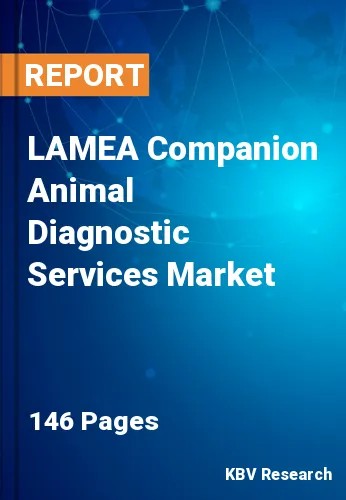The Latin America, Middle East and Africa Companion Animal Diagnostic Services Market would witness market growth of 10.1% CAGR during the forecast period (2023-2030).
An increasing number of households have pets, leading to a greater demand for veterinary services, including diagnostic testing. Ongoing developments in diagnostic technologies and treatments have expanded the range of services available to pet owners. The demand for diagnostic services is rising as pet owners become more aware of the value of preventive care and early diagnosis.
The significance of regular checkups and diagnostic testing for pets is becoming increasingly apparent to pet owners. They recognize that early detection of health problems can result in improved outcomes and a higher quality of life for their animals. Diagnostic tools and technologies have improved significantly, making it easier for veterinarians to accurately diagnose and monitor companion animals' health. This includes advanced imaging techniques, genetic testing, and point-of-care diagnostic devices.
As pets are increasingly viewed as family members, their owners are more inclined to invest in their health. This includes spending on diagnostic services to ensure their pets are healthy and receive proper care. The growth of the pet insurance industry has made it more affordable for pet owners to seek diagnostic services. Insurance coverage reduces the financial burden of expensive diagnostic tests and treatments. Many pet owners are embracing the concept of preventive care, which includes regular checkups and diagnostic testing even when the pet appears healthy. Preventive care can catch health issues early, potentially saving lives and reducing long-term healthcare costs.
The LAMEA region encompasses diverse landscapes, including remote and underserved areas where access to centralized healthcare facilities can be challenging. Portable POC instruments are crucial for delivering essential diagnostic services to these regions. Advanced diagnostic technologies are critical in monitoring and managing the population's health. These advancements in diagnostic technologies in the UAE improve healthcare outcomes, enhance patient experiences, and position the country as a leader in the region for medical innovation and healthcare services. The regional governments’ commitment to healthcare infrastructure development and innovation continues to drive development of market in this region.
The Brazil market dominated the LAMEA Companion Animal Diagnostic Services Market by Country in 2022, and would continue to be a dominant market till 2030; thereby, achieving a market value of $185.6 million by 2030. The Argentina market is showcasing a CAGR of 10.7% during (2023 - 2030). Additionally, The UAE market would register a CAGR of 9.8% during (2023 - 2030).
Based on Type, the market is segmented into Point-of-Care (POC) and Laboratory-based. Based on Animal Type, the market is segmented into Dogs, Cats, Horses and Others. Based on Testing Category, the market is segmented into Clinical Chemistry, Microbiology, Parasitology, Histopathology, Cytopathology, Hematology, Immunology & Serology, Imaging, Molecular Diagnostics and Others. Based on countries, the market is segmented into Brazil, Argentina, UAE, Saudi Arabia, South Africa, Nigeria, and Rest of LAMEA.
Free Valuable Insights: The Worldwide Companion Animal Diagnostic Services Market is Projected to reach USD 10.4 Billion by 2030, at a CAGR of 7.4%
The market research report covers the analysis of key stakeholders of the market. Key companies profiled in the report include Zoetis, Inc., IDEXX Laboratories, Inc., Mars Inc., Fujifilm Holdings Corporation, Embark Veterinary, Inc., Thermo Fisher Scientific Inc., Patterson Companies, Inc., Randox Laboratories Limited, CVS Group Plc, and Neogen Corporation
By Type
By Animal Type
By Testing Category
By Country
Our team of dedicated experts can provide you with attractive expansion opportunities for your business.

